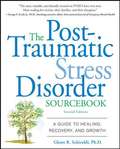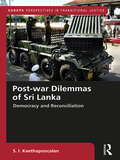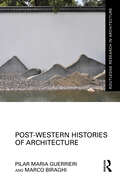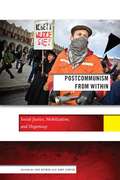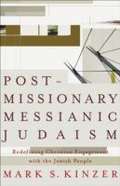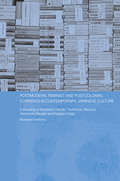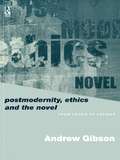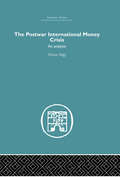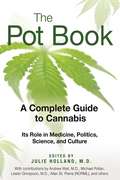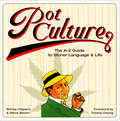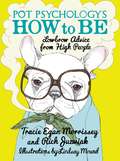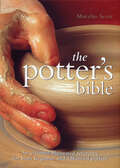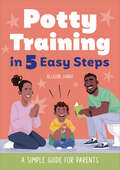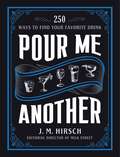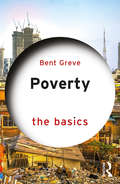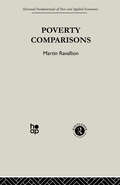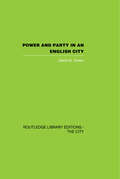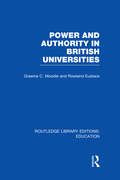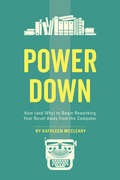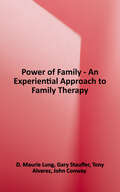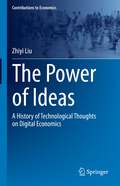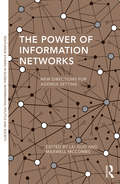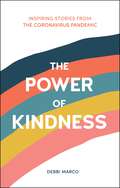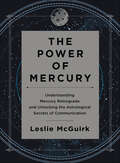- Table View
- List View
The Post-Traumatic Stress Disorder Sourcebook
by Glenn R. SchiraldiTrauma can take many forms, from witnessing a violent crime or surviving a natural disaster to living with the effects of abuse, rape, combat, or alcoholism. Deep emotional wounds may seem like they will never heal. However, with The Post-Traumatic Stress Disorder Sourcebook, Dr. Glenn Schiraldi offers a remarkable range of treatment alternatives and self-management techniques, showing survivors that the other side of pain is recovery and growth. Live your life more fully-without fear, pain, depression, or self-doubt Identify emotional triggers-and protect yourself from further harm Understand the link between PTSD and addiction-and how to break it Find the best treatments and techniques that are right for you This updated edition covers new information for war veterans and survivors with substance addictions. It also explores mindfulness-based treatments, couples strategies, medical aids, and other important treatment innovations.
Post-war Dilemmas of Sri Lanka: Democracy and Reconciliation (Europa Perspectives in Transitional Justice)
by S. I. KeethaponcalanBy investigating Sri Lanka as a case study, this book examines whether democracy, compared to authoritarianism, is conducive to post-war reconciliation. The research, founded on primary as well as secondary data, concludes that political systems have little to do with the success or failure of post-war ethnic reconciliation. The Sri Lankan case indicated that post-war reconciliation is more contingent on the readiness of the former enemies to come together. Readiness stems from, for example, satisfaction in the way issues have been resolved, confidence in the other party's intentions, and the compulsion to coexist. If the level of satisfaction, confidence, and the compulsion to coexist are low, the readiness to reconcile will also be low. The end of the war had a profound impact on post-war governance and ethnic relations in Sri Lanka. Hence, the volume provides an in-depth analysis of the factors that led to the military victory of the Sri Lankan government over the Liberation Tigers of Tamil Eelam (LTTE) in 2009. The chapters delve into the nexus between governance and reconciliation under the first two post-war governments. Reconciliation did not materialize in this period. Instead, new fault-lines emerged as attacks on the Muslim community escalated drastically. This book provides a comprehensive analysis of the nature of relations between the Sinhalese and Muslims and the Tamils and Muslims, as well as the nature and causes of post-war anti-Muslim riots.
Post-Western Histories of Architecture (Routledge Research in Architecture)
by Pilar Maria Guerrieri Marco BiraghiThis book seeks to provide an alternative post-Western perspective to the history of contemporary architecture. It puts forward detailed critical analyses of various areas of the world, including Europe, Latin America, Africa, China, Australia, India and Japan, where particular movements of architecture have developed as active ‘political acts’. The authors focus on a broad spectrum of countries, architectures and architects that have developed a design approach closely linked to the building context. The concept of context is broad and includes various economic, social, cultural, political and natural aspects. In all cases, the architects selected in this book have chosen to view context as an opportunity. However, each architect has considered certain specific aspects of context: some have been very attentive to the social context, others to material aspects or typological issues, and still others to aspects related to political visions or economic factors. The analysis critically highlights interesting, creative and respectful design approaches towards local conditions, such as sustainability in Nordic Europe, climate-conscious design in Africa, and the ‘bottom-up’ sensitivity of India. The book’s main aim is to retrace, through both theoretical arguments and case studies, the debate that focuses on politics and the environment. Thanks to its valuable examples, this book strives to make a conscious contribution to establishing a bulwark against the current ‘flattening-out’ processes that architecture is experiencing. This book will be of relevance to researchers, teachers and students interested in the history of architecture, architecture and planning, and postcolonial studies.
Postcommunism from Within: Social Justice, Mobilization, and Hegemony
by Jan Kubik Amy LinchThis book is a comprehensive collection of essays focused on gender, poverty, and corruption.
Postmissionary Messianic Judaism: Redefining Christian Engagement With the Jewish People
by Mark Kinzer"Mark Kinzer gives us this powerful book in the fullness of time. It probably could not have been written before now [2005], nor can we do without it any longer. The church needs this book to know how to be the church of the God of Israel. Messianic Judaism needs this book to know how to be a Judaism. And Christians and Jews can no longer 'dialogue' as if Messianic Judaism did not exist. In a brilliant, thorough, and compelling way Kinzer boldly interrupts the conversation of contemporary theology with the voice of Messianic Judaism. We are left with no option but to engage it. There is no turning back." In this book, the author discusses all aspects of the Christian-Jewish, Christian, and Jewish experiences embracing both the positive and negative aspects from ancient to modern times. It is important for Christian Gentiles to understand the author's polemics and documentation supporting these arguments in order to avoid making the same past mistakes when engaging with Jewish people. Even though the author, addresses Christian Gentile readers, Messianic-Jewish readers will gain valuable information as well and gain insight into the development and preservation of their unique religious and spiritual experiences. Also, non-religious people will learn about a new, cultural, intellectual, spiritual, and religious movement that is changing the current theological landscape.
Postmodern, Feminist and Postcolonial Currents in Contemporary Japanese Culture: A Reading of Murakami Haruki, Yoshimoto Banana, Yoshimoto Takaaki and Karatani Kojin (Routledge/Asian Studies Association of Australia (ASAA) East Asian Series)
by Fuminobu MurakamiUsing the Euro-American theoretical framework of postmodernism, feminism and post-colonialism, this book analyses the fictional and critical work of four contemporary Japanese writers; Murakami Haruki, Yoshimoto Banana, Yoshimoto Takaaki and Karatani Kojin. In addition the author reconsiders this Euro-American theory by looking back on it from the perspective of Japanese literary work. Presenting outstanding analysis of Japanese intellectuals and writers who have received little attention in the West, the book also includes an extensive and comprehensive bibliography making it essential reading for those studying Japanese literature, Japanese studies and Japanese thinkers.
Postmodernity, Ethics and the Novel: From Leavis to Levinas
by Andrew GibsonIn Postmodernity, Ethics and the Novel Andrew Gibson sets out to demonstrate that postmodern theory has actually made possible an ethical discourse around fiction. Each chapter elaborates and discusses a particular aspect of Levinas' thought and raises questions for that thought and its bearing on the novel. It also contains detailed analyses of particular texts. Part of the book's originality is its concentration on a range of modernist and postmodern novels which have seldom if ever served as the basis for a larger ethical theory of fiction. Postmodernity, Ethics and the Novel discusses among others the writings of Joseph Conrad, Henry James, Jane Austen, Samuel Beckett, Marcel Proust and Salman Rushdie.
The Postwar International Money Crisis: An Analysis
by Victor ArgyFirst Published in 2005. The book has two principal aims. First, to provide a description of the major international monetary developments in the industrial world in the post-war years. Second, to evaluate and analyse these developments by reference to a theoretical framework and, in addition, to look at the key policy issues in the context of the new environment of the last decade.
The Pot Book: A Complete Guide to Cannabis
by Julie HollandLeading experts on the science, history, politics, medicine, and potential of America’s most popular recreational drug • With contributions by Andrew Weil, Michael Pollan, Lester Grinspoon, Allen St. Pierre (NORML), Tommy Chong, and others • Covers marijuana’s physiological and psychological effects, its medicinal uses, the complex politics of cannabis law, pot and parenting, its role in creativity, business, and spirituality, and much more Exploring the role of cannabis in medicine, politics, history, and society, The Pot Book offers a compendium of the most up-to-date information and scientific research on marijuana from leading experts, including Lester Grinspoon, M.D., Rick Doblin, Ph.D., Allen St. Pierre (NORML), and Raphael Mechoulam. Also included are interviews with Michael Pollan, Andrew Weil, M.D., and Tommy Chong as well as a pot dealer and a farmer who grows for the U.S. Government. Encompassing the broad spectrum of marijuana knowledge from stoner customs to scientific research, this book investigates the top ten myths of marijuana; its physiological and psychological effects; its risks; why joints are better than water pipes and other harm-reduction tips for users; how humanity and cannabis have co-evolved for millennia; the brain’s cannabis-based neurochemistry; the complex politics of cannabis law; its potential medicinal uses for cancer, AIDS, Alzheimer’s, multiple sclerosis, and other illnesses; its role in creativity, business, and spirituality; and the complicated world of pot and parenting. As legalization becomes a reality, this book candidly offers necessary facts and authoritative opinions in a society full of marijuana myths, misconceptions, and stereotypes.
Pot Culture: The A–Z Guide to Stoner Language & Life
by Shirley Halperin Steve Bloom“Essentially an encyclopedia of pot, filled with such top 10 lists as ‘best stoner movies’ . . . plus a ‘pot-parazzi’ section with celebrities sneaking a toke.” —BillboardDo you know the difference between burning one and Burning Man? Does using the name Marley as an adjective make total sense to you? Do you chuckle to yourself when the clock strikes 4:20? Are you convinced that the movie Dazed and Confused deserved an Oscar? If you answered “Dude!” to any of these questions, then Pot Culture is the book you’ve been waiting for. For those in the know, it’s the stoner bible. For novices, it’s Pot 101. Either way, Pot Culture encapsulates the history, lifestyle, and language of a subculture that, with every generation, is constantly redefining itself. From exhaustive lists of stoner-friendly movies, music, and television shows to detailed explanations of various stoner tools to celebrity-authored how-tos and an A-Z compendium of slang words and terms, it’s the ultimate encyclopedia of pot. Written by former High Times editors Shirley Halperin (now a senior writer at Entertainment Weekly and a TV talking head) and Steve Bloom (publisher of CelebStoner.com), and featuring contributions by a host of celebrity stoners, including Melissa Etheridge, Maroon 5’s Adam Levine, Redman, Steve-O, and America’s Next Top Model’s Adrianne Curry, Pot Culture provides the answers to everything you ever wanted to know about pot but were too stoned to ask.“This is a fun book that every toker should get their sticky green fingers on. Clever and informative . . . Great book and a must-buy for all us loadies.” —Blogcritics
Pot Psychology's How to Be: Lowbrow Advice from High People
by Rich Juzwiak Tracie Egan Morrissey Lindsay MoundDo you love stylish, sexy advice? Do you love marijuana? Get the best of both worlds with POT PSYCHOLOGY'S HOW TO BE, the hot, new, easy-to-use book from the creators of the Jezebel.com video advice sensation, Pot Psychology. We're Tracie and Rich, and our system guarantees results. We'll tell you how to be, and we'll do so quickly to cater to the attention spans of stoners and busy moms on the go.Want to be around hookers without the sticky, smelly mess? We can help. Need to know how to be about your underwhelming haircut or online relationships? We've got you covered. We've got advice for power bottoms, sideline hoes, bitches, female dogs, and so much more.You could spend hundreds of dollars on advice books, but only HOW TO BE spans the human experience in one personal, versatile volume. But wait, there's more! We also have 101 pictures of animals acting like people.If you are not completely satisfied with HOW TO BE, send it back!* Because ultimately, how to be is happy with your new life.*Refund not guaranteed
The Potter's Bible: An Essential Illustrated Reference for Both Beginner and Advanced Potters (Artist/craft Bible Ser.)
by Marylin ScottAn essential guide for beginner and advanced potters, featuring step-by-step photographs to guide you through a comprehensive range of techniques.Begin making beautiful ceramics, even if you’ve never attempted pottery before, following detailed information about:Essential tools and studio equipmentDifferent types and constituencies of clay—including earthenware, stoneware, porcelain, and rakuForming methods—including pinching, coiling, slabbing, press molding, throwing, and trimmingAdding texture and patterns—with techniques such as sgraffito, stamping, inlaying, and burnishingPainting and printing—using slip, banding and combing, resists, and underglazesGlazes and post-firing techniques—including salt and soda glazes, lusters, and metal leafEssential technical resources—such as glaze recipes, types of kilns and firings, and health and safety tipsWith its combination of practical advice, exciting images, inspirational ideas, and a glossary, this book is a must-have for all potters at any stage of their career.
Potty Training in 5 Easy Steps: A Simple Guide for Parents
by Allison JanduPrepare to change your little one's last diaper Potty training is a huge milestone in your child's life. And yours. Potty Training in 5 Easy Steps is here to help you both transition confidently to a diaper-free life. This practical step-by-step program offers a variety of potty training techniques that can be tailored to your child's age, personality, and behavior during the potty training process. Whether you need potty training for girls or boys, this indispensable potty book will help get your child on the potty and out of diapers! Coordinate care—Tips for day care and a handy notes section make it easy to share strategies with your child's other caregivers. Potty language—Stumped on how to talk your child through training? Explore ideas for what to say during each step of the process. Stay on track—Accidents are bound to happen. This potty book gives you the tools to troubleshoot training issues and offers potty tips for naptime, nighttime, and more. Help your growing child succeed at potty training—all it takes is 5 easy steps.
Pour Me Another: 250 Ways to Find Your Favorite Drink
by J. M. HirschChoose your own cocktail adventure: Use the drinks you already love to explore a world of delicious new spirits, combinations, and flavors. You know what you like to drink—but what&’s next? Expert mixologist and James Beard Award-winning editorial director of Milk Street J.M. Hirsch has the answer in Pour Me Another, where every recipe helps you choose your next drink. Consider the rum Mojito. If that&’s your go-to, you might not consider yourself a bourbon drinker. But a whiskey Mint Julep delivers many of the same refreshing, minty notes. And from there it&’s a short jump to a vodka Mint Fizz, which livens things up with lemon and almond syrup. Or maybe you&’re a bourbon Old Fashioned drinker. Pour Me Another guides you to a gin Bijou, which brings in Manhattan-like notes. Then try a Vieux Carré, with herbal notes atop peppery rye. Soon you&’re sipping a Mexican Vieux Carré, which uses tequila for a similar rich and spicy effect. If a Gin & Tonic is more your speed, head toward tropical territory with a gingery Lime in de Coconut. Like that one? Go for a Coconut-Lime Daiquiri next. Everyone loves a Margarita, but have you tried the Manhattan-inspired La Rosita? Discover the versatility of vodka with a cousin to the Martini, in the botanical Stupid Cupid. No matter your taste or liquor of choice, Pour Me Another guides you to a new world of drinks you&’ll love. It&’s an essential handbook for cocktail lovers and home mixologists everywhere.
Poverty: The Basics (The Basics)
by Bent GrevePoverty has dire consequences on the ability to fulfil one’s aspirations for life. Poverty has strong implications for social cohesion and societies’ abilities to function in harmonious ways. This book presents the readers with the core concepts, latest development and knowledge about policies that work to eliminate absolute poverty. This volume shows what the consequences are for the quality of life of those living in poverty. It describes life for people in poverty in general, but also deals more specifically with children, in-work poverty and the elderly, thus providing a life, generational and global perspective on poverty, including the impact on people’s happiness levels. The book also discusses policies aimed at poverty reduction, such as changes to the labour market – including the risk of working poor – and shows that there is a variety of possible instruments available to reduce poverty. These range from direct provision of social security to ensuring education and a better functioning labour market. Written in an engaging and accessible style, the book provides a succinct insight into the concept of poverty, how to measure it, the situation of poverty around the globe as well as different types of possible interventions to cope with poverty. Supporting theory with examples and case studies from a variety of contexts, suggestions for further reading, and a detailed glossary, this text is an essential read for anyone approaching the study of poverty for the first time.
Poverty Comparisons: A Guide To Concepts And Methods (Living Standards Measurement Study Working Papers #No. 88)
by M. RavallionPoverty comparisons - such as whether poverty has increased, or where it is greatest, are typically clouded in conceptual and methodological uncertainties. How should individual well-being be assessed in deciding who is poor? Is a household survey a reliable guide? Where should the poverty line be drawn, and does the choice matter? This monograph surveys the issues that need to be considered in answering these questions, providing an accessible introduction to the most recent literature. The strengths and weaknesses of past methods are discussed, and a summary of methodological recommendations is given. A number of new analytical tools are described which can greatly facilitate poverty comparisons, recognising the uncertainties involved.
The Poverty of Economic Thinking: Classical Economics, Neoclassical Economics and Modinomics
by Jebamalai VinanchiarachiThe revised edition of the book is at the request of many friends. Chapter 12 on Sustaining Inclusive High Growth is added to the revised edition. The new era of creative destruction is underpinned by rapid, revolutionary and complete changes which make deep inroads into productive and service activities. The priority accent of those changes is on economic efficiency, ecological compliance and social inclusion. The incidence of technical progress, in particular, facilitates our march towards achieving efficiency in all that we do. Economic thinking should be at least one step ahead of this march to predict and make a better future course of action required for saving the people and the planet.
Power and Party in an English City: An account of single-party rule (The\new Local Government Ser. #No. 20)
by David G. GreenPower and Party in an English City provides an account of how decisions are taken by the state at the level of locality. More specifically, it is an account of the private policy-making activities of a ruling Labour group of councillors in the major English city of Newcastle-Upon-Tyne. Despite the fact that local government in most of the towns and cities of England is one-party government, very little is known abotu the private behaviour of ruling party groups. In this book David Green provides a penetrating empirical study of the realities of local government. The author seeks to examine and analyse the importance of party discipline, the relationship between the Labour group of councillors and the party outside the council, the power of the committee chairmen, the role of local patronage and the openness of the local policy-making process. The government of Newcastle is perhaps the most closely association in the public mind with T. Dan Smith, the corrupt local politician. In fact, Smith had left local politics in Newcastle in teh mid-1960s. How was the city being run a decade or so later? This study is however much more than an inside view of the affairs of a single authority. The last part of the book is devoted to a discussion of aspects of some traditional and modern theories of democracy and specifically to what author sees as the inadequate advocacy of participatory democracy in recent years. Green makes a major contribution to our thinking about the kind of democracy that is possible in modern large-scale societies, explores weaknesses of moder theories and puts forward some original modifications to modern democratic theory, in the light of a theory of knowledge which is seen as more appropriate for modern natural and social scientific activity. This book was first published in 1981.
Power & Authority in British Universities: Graeme C. Moodie And Rowland Eustace (Routledge Library Editions: Education)
by Graeme Moodie Rowland EustaceIn facing the question ‘who runs the universities’, the authors have carried out over a period of years an extensive programme of interviews, both formal and informal, as well as a detailed study of documents. Their findings are written up in the language of politics – in terms of power, authority, influence, regulation and decision making. The result is thus of value both to those with a practical interest in universities and to those with a more theoretical interest in politics or organisational behaviour.
Power Down: How (and Why) to Begin Reworking Your Novel Away from the Computer
by Kathleen McclearyWhen you're ready to revise your novel, move away from the computer screen and take a hands-on approach. In "Power Down," Kathleen McCleary offers techniques, tools, and tips for revising away from the computer. This exclusive e-book offers a fresh perspective for your work-in-progress and teaches you how to focus your attention more fully at this critical stage. Kathleen McCleary is the author of three novels: House and Home (2008); A Simple Thing (2012), nominated for the Library of Virginia Literary Award in fiction; and Leaving Haven (2013), a Target Emerging Author pick. Her nonfiction articles have appeared in Parade magazine, The New York Times, The Washington Post, Good Housekeeping, and many other publications. She has taught writing as an adjunct professor at American University and is an instructor with Writopia Labs, a nonprofit that teaches creative writing to kids. Learn more about Kathleen on her website: www.kathleenmccleary.com.
Power of Family: An Experiential Approach to Family Treatment
by John Conway Gary Stauffer D. Maurie Lung Tony AlvarezThe authors invite you to explore the intentional use of interactive interventions as a primary methodology in family treatment. The activities they introduce into the therapy office provide an immediate context for witnessing how the family functions first-hand. In this manner, families reveal systems, structures, cognitive and emotional processes, strategies, communication styles, approaches to problem-solving, as well as other issues traditionally targeted in the process of family treatment. The intent is to provide an environment that allows family members to freely and genuinely demonstrate their strengths and limitations.
The Power of Ideas: A History of Technological Thoughts on Digital Economics (Contributions to Economics)
by Zhiyi LiuAs the first academic monograph that a Chinese scholar discusses the histories of thoughts and ideas related to the development of digital economics, this book aims to make research from the perspective of the history of ideas and discuss the ideas influencing the development of digital economics and the evolution of related theories and thoughts with the methodology of interdisciplinary research.The human society is in the stage of major historic transition and enters the digital world with the main goal of developing the artificial world. In this world, the development of digital economics is significantly characterized by the deep interaction between the real and the virtual worlds, while the key triggering this paradigm reform is the evolution of ideas since the modern times. While involving the field of computer, these thoughts are also related to the fields of philosophy, ethics, communication and economics. Therefore, the results of the research on the history of ideas related to digital economics are required to really understand the depth of this discipline. If computationalism is the most important paradigm evolution of natural science, the most important paradigm evolution of social science is interdisciplinary complex science. In the meantime, this book is the most significant in understanding the nature of paradigm evolution related to the development of digital economics from the perspective of complex science and interdisciplinary systematic researches.Digital economics is in the foundation-laying phase, while this book mainly aims to historically narrate the thoughts of this discipline and hopes that readers can understand the influence of ideas in the old era on shaping the disciplines in the new era while exploring this new discipline. The construction of digital economics is a process of evolution. This book will be helpful to understand the underlying logic of the ideas constructed by the thinkers in different fields.
The Power of Information Networks: New Directions for Agenda Setting (Routledge Studies in Global Information, Politics and Society)
by Lei Guo Maxwell McCombsThe news media have significant influence on the formation of public opinion. Called the agenda-setting role of the media, this influence occurs at three levels. Focusing public attention on a select few issues or other topics at any moment is level one. Emphasizing specific attributes of those issues or topics is level two. The Power of Information Networks: The Third Level of Agenda Setting introduces the newest perspective on this influence. While levels one and two are concerned with the salience of discrete individual elements, the third level offers a more comprehensive and nuanced perspective to explain media effects in this evolving media landscape: the ability of the news media to determine how the public associates the various elements in these media messages to create an integrated picture of public affairs. This is the first book to detail the theoretical foundations, methodological approaches, and international empirical evidence for this new perspective. Cutting-edge communication analytics such as network analysis, Big Data and data visualization techniques are used to examine these third-level effects. Diverse applications of the theory are documented in political communication, public relations, health communication, and social media research. The Power of Information Networks will interest scholars, students and practitioners concerned with the media and their social and cultural effects.
The Power of Kindness: Inspiring Stories, Heart-Warming Tales and Random Acts of Kindness from the Coronavirus Pandemic
by Debbi MarcoKindness mattersWhen times are hard, we pull together. Despite the difficulties of life during the coronavirus pandemic, love and kindness prevail.Dive into this heart-warming book and discover the many uplifting and inspiring acts of kindness that have come from the crisis. Read about the postman who donned fancy dress while doing his rounds to bring a smile to his community, the mum who set up a virtual story time for young children, or the schools that worked together to manufacture face masks for local care homes and hospitals.The coronavirus crisis may be a challenging time for the world, but the amazing stories in this book show that nobody is too small to make a difference – and that, no matter what, we can always find light in the darkness.
The Power of Mercury: Understanding Mercury Retrograde and Unlocking the Astrological Secrets of Communication
by Leslie McGuirkA lively guide to surviving and thriving during Mercury Retrograde—and to unlocking the astrological secrets of Mercury, the planet that rules communication.Mercury Retrograde: We’ve all heard about its effects. E-mails disappear into black holes. Flights are delayed and trains run late. From communication mishaps to travel breakdowns, Mercury Retrograde wreaks utter havoc on our lives. So how do we survive it, sanity and relationships intact?In The Power of Mercury, acclaimed astrologer Leslie McGuirk casts new light on Mercury Retrograde—treating it as an opportunity to slow down in a tech-crazed world, from approaching agreements with caution to communicating with intention. With an unparalleled sense of humor and uncommon helping of straight talk, McGuirk further dispels the mysteries of Mercury Retrograde by teaching us how to identify our personal Mercury signs and those of the people with whom we interact every day, from bosses to romantic partners—and what that means for how we communicate, and what to do about it. In our ever increasingly tech-driven, fast-paced world, where we all email, text, chat, and tweet hundreds of times a day, and zip around the world at a moment’s notice, the stakes for any glitches in communication are higher than ever. Finally, with The Power of Mercury, we have the fresh, direct guide we need to navigating it all without stress—and with a much needed dose of optimism, common sense, and style.
